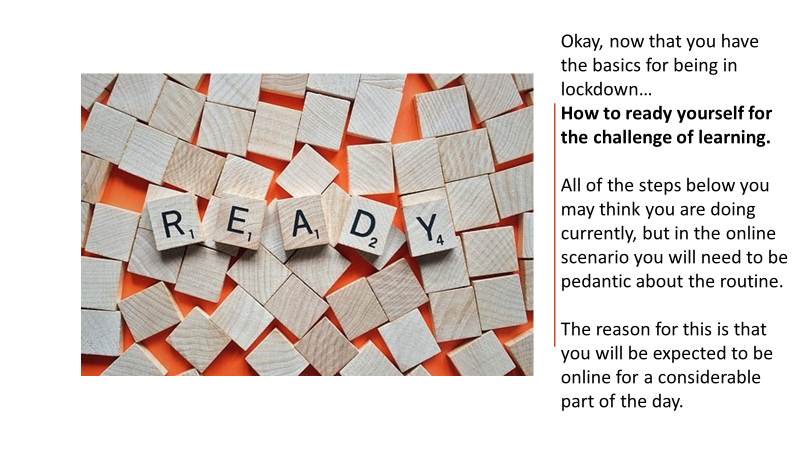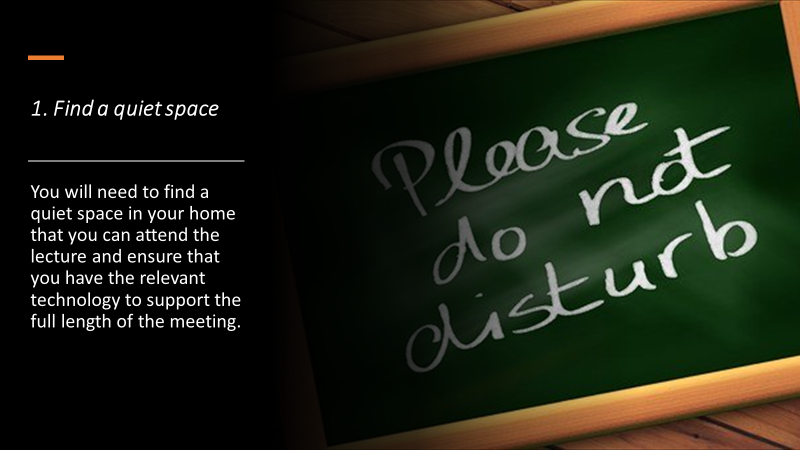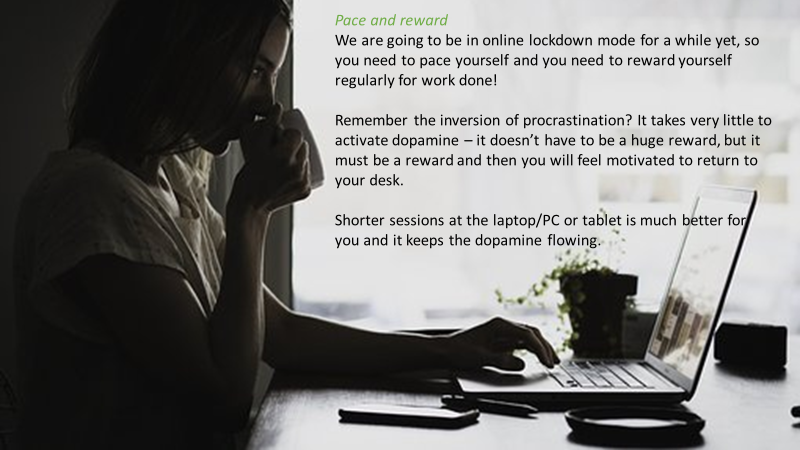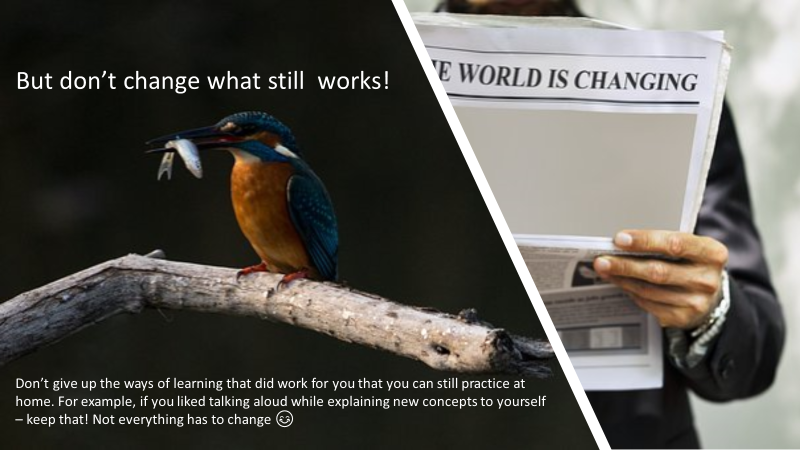Content begins here
Main page content
Click to collapse
It is a myth that being glued to the screen will yield the best results.
You need to be attentive to how your brain and your body responds in times of stress so that you can get yourself out of the maze of illusionary productivity.
The truth is that learning online is physically more demanding for your brain and you need to be conscious of that. This page will be bringing you some tips on the skills you need to navigate the new waters of online learning so that you don't feel as if you're treading water all the time.

There has been a lot of advice on how to deal with lockdown and a lot of this can be ported to the endeavour of learning online. Before reading the specific guidelines below also remember the following takeaways for dealing with lockdown – you may have started them already:
- Have a routine
- Organise your workspace
- Dress up for class 😊
- Move regularly
- Nourish your body, heart and mind
- Connect with others
- Keep up to date BUT limit your exposure to media
- Reward yourself by having fun spots in the day

Some universities have said that your studies could be up to 30 hours a week – but no more.
That’s a lot of time to be looking at a screen and receiving new knowledge, however if you take them in tranches you could have three sessions of 2 hours on a day – with breaks in between of course – because you should relieve your eyes and your brain regularly. Or you could do a variation of time periods – but you need to be sure to log the time.
Let’s see if the guidelines below can be of help.

2. Preparation for lectures is absolutely essential
Given that you have completed the required pre reading in advance of the lecture you also need to:
- Prepare questions that you hope will be answered in the online lecture.
- This is paramount for making sure you leave no concept behind.
- Ask the lecturer the questions that were not covered through the chat room provided. OR via the relevant chat room in your learning management system (LMS) like Vula or Moodle etc.
- Be ready several minutes before the start of the lecture – even if you have scheduled the viewing for yourself.
- Practice bringing your mind into the present through the breath before joining the group (just a few minutes will make all the difference)
- Smile when you greet your peers if you are having a real time lecture / Webinar

3. Full engagement at the time of the lecture is key to understanding - particularly for live transmissions
Your brain is used to taking in a whole lot of information along with the lecture normally, but this setting is different; you have to bring your attention back to the present and engage your working memory – the best mechanism for concentration. Remember that you are not used to online learning and neither are your lecturers used to teaching this way either! You may have to make up for them not being able to hold your attention.
- Make sure you are well rested, not hungry and not overly satiated either
- Have water at your side
- If you are watching with others agitate for breaks when you are feeling your mind is straying
- A break can be a change in format not necessarily moving away from the screen, you could have group activity or question time for example – a check in on whether you and your buddy understand the material
- If you are watching on your own – PAUSE the transmission – GO BACK to where you lost concentration
- Make some notes, check your notes make sense
Check that your space is well ventilated, you are not too hot or too cold

4. Consolidation as soon after the lecture as possible is vital
The first thing you are going to want to do is take a break after the lecture. This is normal and it will be good to reward yourself with a ‘short break’. Do something physical. Do something that does not involve a blue screen. Do something you had planned to do – that would be the best option.
When your break is over:
- Go over the lecture notes and the recording as soon after the event as possible
- This is necessary for assimilation of the knowledge
- Develop different ways of reading the material before and after the lecture
- This will help your brain to store the new concepts in your long- term memory
- You could use diagrams, you could send a voice note to a peer
- Write instead of watch
- Make a short summary of the salient points.
- Remember you will still have to write/ type your assessments so you need to practice articulating your understanding in words – that has not changed as a measure of assessing your understanding
5. Being constantly glued to the screen will not yield the best results
You need to be attentive to how your brain and your body responds in times of stress so that you can get yourself out of the maze of illusionary productivity. The truth is that learning online is physically more demanding for your brain and you need to be conscious of that. Movement and reward are the antidotes here.
Online learning has its own fatigue threshold.
If you work continuously for days on end and you do not discipline yourself to move away from the screen every twenty – thirty minutes for a short break when you’re not in a lecture - you will develop a form of accumulated exhaustion. This is often manifested in a lack of motivation to study or a lack of enjoyment in studying. The deeper the spiral the worse the feeling. You don’t want this – this is deadly for learning and it is easily avoided. Here are a few tips on how to avoid the fatigue related to bad learning habits.

Keep your horizons close
Focus on the closest objectives/ deliverables/ assignments and reserve your long- term planning for when you’re done with the first objective. You may have to do this per module or course. After your planning move back into the ‘close horizons mode’. This allows you to focus on the process more than the outcome and is much more effective for learning and long-term assimilation of knowledge. It also helps reduce any feeling of being overwhelmed by so much learning.
Create opportunities for feedback
It is easy to get immediate feedback from peers and lecturers in a face to face context. You are going to have to create opportunities for such engagement now. You will need to set up times for chatting and for what you will discuss. Have two asynchronous components to your discussions – social and learning – in equal measure.
Embrace the new way of teaching and learning but don’t trash the things that worked
Of course, you are going to hate it at times, but when you start feeling that way it is time for reflection. Try and work out what has led you to feel that way and whether or not you haven’t over-extended yourself. Maybe you are behind with your work? Get back to your short- term objectives and get back into your routine

Mindfulness practice is the bomb!
Regularly bringing your attention to the present through the simple act of breathing or listening to the soundscape around you is one way to give your brain a rest and to recharge your attention batteries. The breath has a profound effect on our mental and physical wellbeing; it is the simplest and most primitive act of our being. It is also the most accessible. I have included details of IMISA (Institute of Mindfulness of South Africa) for your benefit here. In addition they have a series of podcasts which are inclusionary on all levels. Please reward yourself with a listen!
